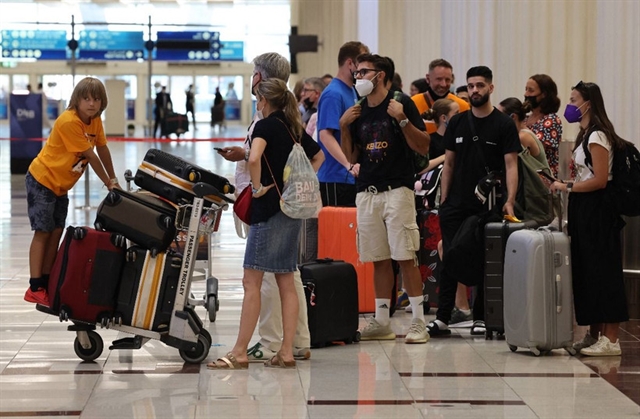 Life & Style
Life & Style

 |
| Dr. Nguyen Trung Ha – Photo by Hanoi French Hospital |
By Dr. Nguyen Trung Ha*
------------------------------------
Pneumonia in children is a serious, acute lower respiratory tract infection that affects the lungs and can result in respiratory failure. It is the leading cause of death in children worldwide and can occur at any age, although is more common in infants younger than two. According to the WHO and UNICEF, pneumonia accounted for 16 per cent of all deaths of children under five in 2015. At the Hanoi French Hospital, in 2016 bronchopneumonia and pneumonia inpatients accounted for 25 per cent of hospitalized children with respiratory tract infections.What is the epidemiology?
The disease occurs throughout the year but is more common in autumn, winter and early spring and is mostly transmitted by inhalation of bacteria in the mouth and throat or particles that spread from sneezing or coughing of another sick person. Newborns can get sick through vertical transmission from their mothers during birth.
What is the cause?
Any microorganism can cause pneumonia. In kids over five the cause is mostly bacteria while in younger children it’s mostly due to a virus. It can be tricky to distinguish between the two. Some kids with low immunity may get a viral infection first, complicated by a bacterial super infection later. The most common microorganisms responsible are streptococcus pneumoniae, hemophilus influenzae type b, group B streptococci, mycoplasma pneumoniae, respiratory syncytial virus, influenza virus and adenovirus. Vaccines are available for most of these pathogens.Which children are at high risk for pneumonia?
· Children living in crowded homes, polluted cities, and those exposed to tobacco smoke or coal stove smoke;
· Children with low immunity (premature infants, non-breastfed or malnourished children);
· Children with a chronic diseases, such as congenital heart disease, asthma, reflux, etc.
Signs and symptoms
Like many infections, pneumonia usually produces a fever, which in turn may cause sweating, chills, flushed skin, and general discomfort. Loss of appetite and energy is also common. Babies and toddlers may seem pale and limp, and cry more than usual. Because pneumonia can cause breathing difficulties, other, more specific symptoms may occur:
· Cough;
· Fast, labored breathing;
· Flaring (widening) of the nostrils;
· Pain in the chest, particularly with coughing or deep breathing;
· Bluish tint to the lips or nails, caused by decreased oxygen in the bloodstream.
Diagnosis and treatment of pneumonia
Although the diagnosis of pneumonia can usually be based on the signs and symptoms, a chest X-ray sometimes is necessary to ascertain the diagnosis and to determine the extent of lung involvement. Blood tests, cultures of respiratory secretions are also sometimes conducted to determine the cause of the infection. Depending on the child’s age, and the cause and severity of the disease, the doctor may prescribe antibiotics, and supportive medications.When do children have to be hospitalized?
Most children with pneumonia can be treated at home. In some severe cases though, hospitalization may be required. Hospitalization is recommended for the following cases:
• Fever lasting more than a few days despite antibiotic treatment;
· • Breathing difficulties;
· • Evidence of an infection elsewhere in the body: red, swollen joints, bone pain, neck stiffness, vomiting, or other new symptoms or signs;
· • Pneumonia in infants younger than 6 months of age;
· • Children, who are not seriously ill but cannot swallow oral medicine, are vomiting or who are eating poorly.
· • Children at any age and with any disease severity whose family cannot provide appropriate care and assure compliance with the treatment plan and/or lives far away from a hospital.
How to take care of a sick child at home
Follow the doctor’s treatment plan:
• Give the child the right dose of medicine, at the intervals and for the duration prescribed. Regularly inform the doctor about any abnormalities. Do not stop or change drugs without consulting your doctor;
• Make sure the child is as comfortable as possible, and gets plenty of rest and nutrients. Because pneumonia can cause vomiting, smaller more frequent meals are advised;
• Give fever-lowering medication such as paracetamol according to the doctor’s instructions;
• Do not give the child medicines that suppress a cough. They don’t usually work well, and can have serious side effects in children;
• Do not give aspirin or medicines that contain aspirin to children younger than 18. In children, aspirin can cause a serious problem called Reye Syndrome;
• Recheck with your pediatrician immediately if the symptoms do not improve after two days of treatment or the child seems more seriously ill. A change of medication or hospitalization may be needed.
How to prevent pneumonia in a child
· Provide adequate nutrition to improve natural defenses, starting with exclusive breastfeeding for the first 6 months of life;
· Keep children in a healthy living environment, free from tobacco smoke and other pollutants;
· Avoid crowded spaces and people who show signs and symptoms of a cold;
· Wash hands regularly;
· Wear a mask when you have a cold and are around your children;
· Vaccinate children. Vaccination is the most effective preventive measure for many causes of pneumonia and other communicable diseases in children. It also boosts the overall immune system of your child.— Hanoi French Hospital
---
*Dr Nguyen Trung Ha, MD, M.Sc. is the Head of Pediatrics at Hanoi French Hospital with over 20 years of experience in treating little ones.
For more information on your child’s health and vaccination, please contact us at 84 – 24.3577.1100, access www.hfh.com.vn, or email us at contact@hfh.com.vn. Address: 1 Phương Mai, Đống Đa, Hà Nội




